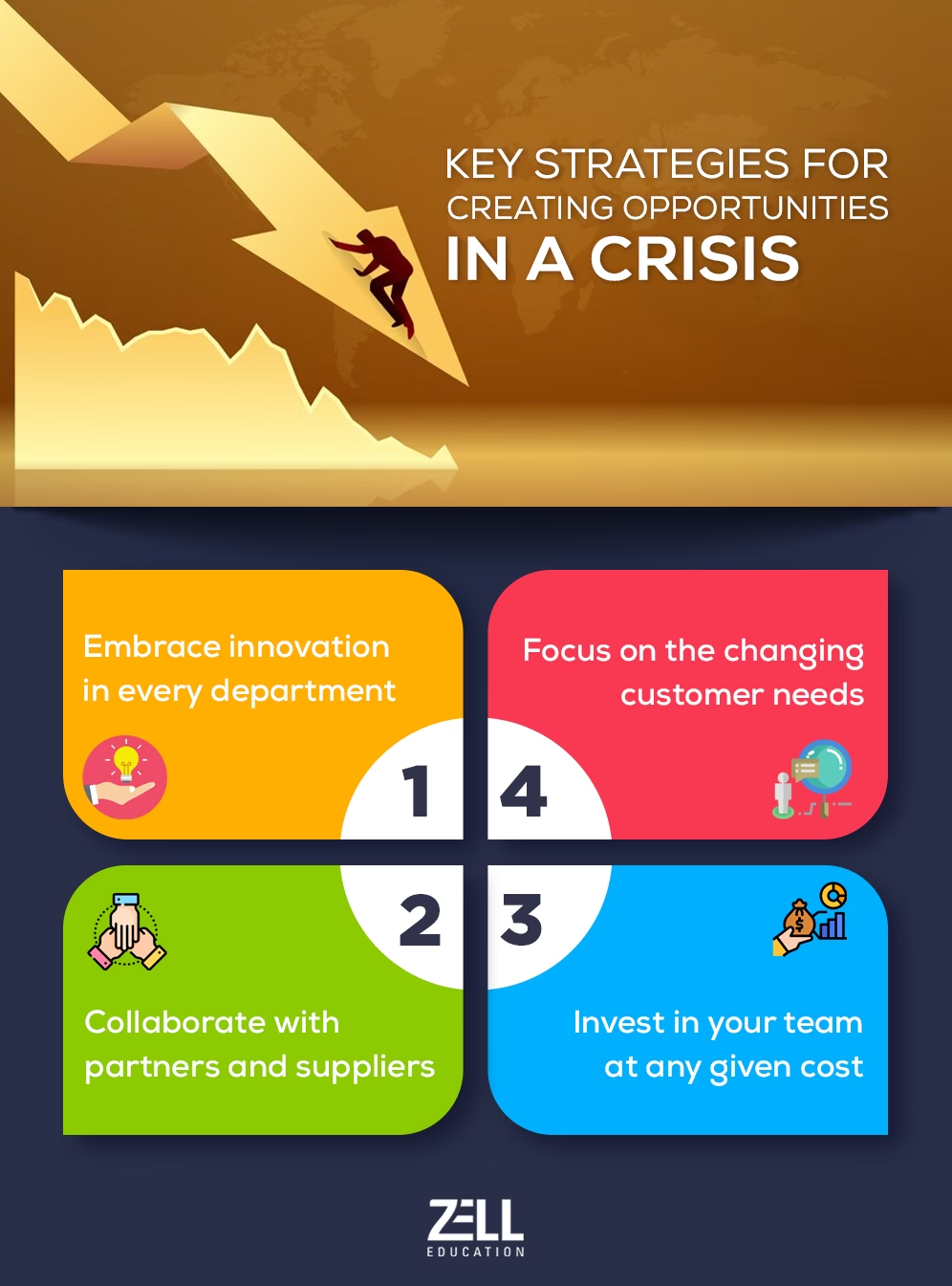Finance professionals are extremely important when it comes to managing risks and identifying opportunities for organisations to thrive amidst uncertainty. The scale of the finance industry offers a multiplicity of options for professionals to capitalise on during a crisis, whether within traditional finance jobs or entrepreneurship in the finance industry.
This article will examine how finance professionals can create opportunities in crises with key strategies, best practices, and real-world examples of crisis management and opportunity creation in finance. By using these insights, the professional in finance can position him- or herself and their organisations to succeed either in pursuit of new opportunities or in setting a new venture in finance.
Understanding Financial Crisis Management
Financial crisis management means knowing the risks that may negatively impact the financial health of a company. Effective leadership is exemplary in ensuring that risk management policies are enforced and contingency plans are developed.
Finance professionals are important for managing financial operations and for remaining knowledgeable about industry trends.
Read our Best 10 Tips To Become a Successful Finance Professional blog to learn more about a career in finance.
The Importance of Identifying Opportunities in a Crisis
Opportunities need to be identified in times of crisis to ensure business survival and prosperity. Here are some reasons why it’s important:
- Diversify Revenue Streams: Businesses may experience a decline in sales or revenue in their core markets or products during a crisis. Companies can maintain revenue streams and create new ones by identifying opportunities to diversify into new markets or products.
- Cost-cutting and Improvement in Efficiency: When a business is on its knees, times of crisis require cost-cutting and improvement in efficiency to survive. In such a situation, finance professionals can help in identifying the cost-cutting measures and improvement in operations, thereby helping the companies bridge over the storm.
- Build Resiliency: Identification of opportunities during a crisis makes businesses more robust and resilient for any future storms. Financial professionals can help companies prepare for contingencies and risk management strategies that help them survive any future storm.
If you are considering shifting to a career in finance, check out our blog, How To Transition Into A Finance Career, for valuable insights and information.
Here are a few key strategies for creating opportunities in a crisis:
Embrace Innovation: Crisis often leads to innovation. There are opportunities to develop new products and services to meet customers’ needs in this climate. Use the opportunity to explore technology applications for improving process efficiency and making your operations more efficient. Look for new ways of leveraging the same resources and capabilities in new ways.
Partnership and Cooperation: It involves cooperating with other companies or suppliers concerning the development of new products or services, cost-cutting measures, or even risk spreading. With partners, explore new channels for distributing products and new markets.
Focus on Customer Needs: Customer needs can shift quickly in a crisis. Understand customers’ needs and pain points and develop products or services that meet those needs. Be responsive to customer feedback to alter your offering.
Invest in the Team: The greatest asset any business can have is its team. Invest in training and development of staff. Support creativity and collaboration, and empower a group to take ownership of new initiatives.
Examples of Successful Crisis Management and Opportunity Creation in Finance
Two examples of successful crisis management and opportunity creation in finance are:
- Goldman Sachs managed to weather the 2008 financial crisis after it transformed itself into a bank holding company, through which it gained access to Federal Reserve funds during the crisis. This move helped the company to stabilise and emerge from the crisis more robustly than ever.
- The 2020 COVID-19 pandemic allowed many financial institutions to accelerate their digital transformation. Banks such as JP Morgan and Bank of America invested heavily in their online and mobile banking platforms, which allowed them to continue serving their customers despite widespread lockdowns.
If you want to pursue jobs in the finance industry abroad, check out our blog Finance Professions That Have A Great Demand Overseas.
Best Practices for Finance Professionals To Stay Ahead of the Curve During a Crisis
Here are some best practices for finance professionals to stay ahead of the curve during a crisis:
Stay Informed
Finance professionals will be required to stay updated with the latest developments that characterise the crisis and those impacting the economy and hence finance at large. They should frequently check up-to-date sources of news, government proclamations, or industry reports.
Scenario Planning
Finance professionals should plan for several scenarios that can occur under crisis conditions. It would help develop contingency plans and, therefore, risk mitigation.
Be Agile
Finance professionals need to have agility in market environment transformation. They need to be versatile in terms of changing rapidly and aligning strategies and operations of their businesses in response to the changed requirements of customers and clients.
Leverage Technology
Finance professionals should use technology to streamline their operations and improve their efficiency. They will reduce the cost, enhance productivity, and improve customer experience with the help of technological leverage.
Maintain Strong Relationships
Finance professionals have to maintain relationships with clients, customers, and stakeholders. Communication is vital during the crisis, frequent, and transparent to build trust and confidence.
Focus on Long-term Value
Finance professionals should focus on providing long-term value for organisations and other stakeholders where they are working. It is essential to ensure that the investment and initiatives set up are meant for sustainable growth and profitability in the long run.
Foster a Culture of Innovation
Finance professionals should develop an innovation culture in organisations. Innovation culture can drive employees to think creatively to develop new ideas and solutions that will help the organisation survive in a crisis.
These best practices can help finance professionals stay ahead of the curve during a crisis and position their organisations for success in the future.
Planning to pursue a global accounting career?
To Book Your Free Counseling Session
Conclusion
Crises can provide a chance for finance professionals to add value and make their organisations thrive. Zell Education provides holistic CFA and US CMA courses to prepare the finance professional with the appropriate knowledge and skills to perform well in the finance sector. Our courses are perfect for those applying for jobs in the finance sector or venturing into entrepreneurship in the finance sector. Enrol in our courses at Zell Education today to position yourself well for success in financial crisis management.
FAQs
What is financial crisis management?
Financial crisis management involves the measures individuals, organisations, and governments take to minimise the adverse effects of the financial crisis by bringing stability to the financial markets, managing liquidity, and bringing back confidence in the financial system.
What are the four stages of crisis management?
It includes four stages: prevention and preparation, response, recovery, and learning. These include the actions taken to prevent a crisis, manage the response during the crisis, restore regular operations, and learn from the crisis in preparation for better future crisis management.
What are the types of financial crises?
Financial crises include banking, currency, debt, and systemic problems.
What causes a financial crisis?
Different factors, such as economic imbalances, speculative bubbles, excessive debt, market disruptions, and external shocks like pandemics or natural disasters, cause financial crises.
Why Zell?
- • Largest Provider for Global F&A Courses
- • 4.6 Google Review Rating
- • 1000+ Global Placement Partners
- • Placement Opportunities at the Big 4
- • 100+ Global & Indian Rank Holders
- • 100+ Faculty Network
- • 10,000+ Students Placed
Speak to A Career Counselor
10-Year Zell Discount: Secure Your Offer Now!


